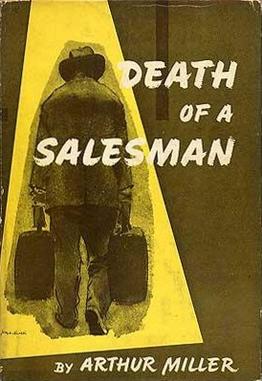Here goes some excerpt from the Wikipedia entry:
Death of a Salesman is a 1949 play written by American playwright Arthur Miller. The play ran for 745 performances, winning both the Tony Award and the Pulitzer Prize for drama. The original production was directed by Elia Kazan with Lee J. Cobb starring in the leading role of Willy Loman.
The play attempts to raise a counterexample to Aristotle's characterization of tragedy as the downfall of a great man: though Loman certainly has hamartia, a tragic flaw or error, his downfall is that of an ordinary man. In this sense, Miller's play represents a democratization of the ancient form of tragedy; the play's protagonist is himself obsessed with the question of greatness, and his downfall arises directly from his continued misconception of himself--at age 63--as someone capable of greatness, as well as the unshakable conviction that greatness stems directly from personal charisma or popularity.
And this line of text caught my eye on that web page too:
Sandage, Scott A. (2005). Born Losers: A History of Failure in America. Cambridge: Harvard University Press.

No comments:
Post a Comment